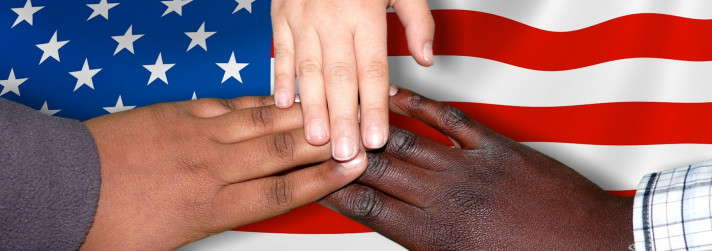Racism in, and on, America
From the musical "Avenue Q," the song "Everyone's a Little Bit Racist":

Everyone's a little bit
Racist, sometimes.
Doesn't mean we go around committing
Hate crimes.
Look around and
You will find,
No one's really
Color-blind.
Maybe it's a fact
We all should face.
Everyone makes
Judgments...
Based on race.
Is it true? Is everyone a little racist, sometimes?
And if it is, what can we do about it?
First, we have to define racism.
For me, it is making judgments about a person based on his or her race. Those judgments can be made by a person of any race about a person of any other race.
In other words, contrary to a popular academic views, Black people can be racist. Just like everyone else.
As a matter of fact, African Americans sometimes discriminate against each other on the basis of color, with the lighter-skinned people feeling themselves to be superior to their darker brothers and sisters. That's called colorism, and it was a theme mined by Spike Lee in his movie, "School Daze" in the animosity between lighter-skinned “Wannabes,” and the darker-skinned “Jigaboos.”
Lighter being better, and blacker being ugly, is a subtheme in “The Bluest Eye,” which Toni Morrison blames on a white superiority that is unconsciously internalized by Black people. The book was published in 1970, and it is set in the 1940s. Does the self hate continue today, after the "Black is beautiful" movement?
Next up -- level, or intensity, of racism.
As crime is divided into felonies and misdemeanors, we should recognize degrees of racism. A song lyric, or a verbal “micro aggression,” isn’t the same as a lynching.
If actions physically hurt someone, that’s a felony. If only feelings are hurt, that’s a misdemeanor.
Felonies include denying someone a job or housing, or anything else, on the basis of color. Those are actually crimes. Stereotyping Black people as “lazy” is provably wrong, but permissible free speech, which is protected.
When do racist ideas take root?
We are not born with them, as you can see any time you put toddlers of different races into a tot lot. They all play together. Bigotry is not internal.
So where does it come from?
The answer was supplied by Rodgers and Hammerstein in their 1949 ground-breaking musical, “South Pacific.” Specifically in the song, “You’ve Got to be Carefully Taught” to hate:
You've got to be taught
To hate and fear,
You've got to be taught
From year to year,
It's got to be drummed
In your dear little ear
You've got to be carefully taught.
You've got to be taught to be afraid
Of people whose eyes are oddly made,
And people whose skin is a diff'rent shade,
You've got to be carefully taught.
You've got to be taught before it's too late,
Before you are six or seven or eight,
To hate all the people your relatives hate,
You've got to be carefully taught!
This is sung by Naval Lt. Joe Cable, who falls in love with a Polynesian girl, who he knew would not be accepted in his native Philadelphia.
Navy Nurse Nellie Forbush falls in love with a French planter on the South Pacific island where she is stationed, and falls out of love with him when she learns his late wife was a native woman and his children are mixed race.
Both Cable and Forbush unlearn the hate they were taught.
Yes, that is fiction, of course.
“South Pacific” was produced 74 years ago, and America has changed greatly since then.
Public accommodations and voting rights laws have been passed, and segregation is on the ash heap of history.
There are Black mayors and chiefs of police across all of America, which has had a successful Black president.
America has seven Black billionaires, and its worlds of sports, film, and recording are dominated by Black stars.
In the most telling statistic, intermarriage reported at 3% in 1967, rose to 7% in 1980, and doubled to 17% in 2015, according to the reliable Pew Research. In 2015, Pew found 6.9% of Americans claimed to be multi-racial, and their numbers are growing.
It has been proven that each successive generation exhibits less bias than the generation it succeeds.
Does this mean, eventually, there will be no bias, no discrimination, no race hatred?
I wish.
It is a sad comment on the human condition that some of us can’t feel good without feeling superior to someone else. Sometimes it’s wealth, sometimes it’s athletic, sometimes it’s religion, sometimes it’s race.
There will always be racism. No government can prevent that.
Effective governments guarantee that someone’s bias can never be used to block the progress of anyone else.
If it is true that everyone is a little bit racist, our job is to keep it under a rock, where it can do no harm.
More Americans feel that way than ever before. More Americans took to the streets to protest the murder of George Floyd than did the same in my youth to protest segregation and racial injustice.
It is a cause for hope.



